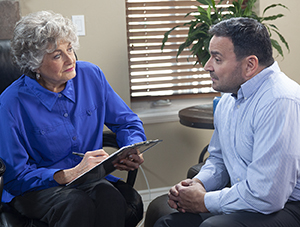Recovering from Addiction: Continuing with Counseling
The road to recovery can be tough. But working with a counselor can help make your recovery smoother. And it can keep you on track. A counselor can help you decide which lifestyle changes you want to make to stay sober. Also think about talking with a counselor about other issues you may want to work on. They can help you find resources for anger management, problem-solving skills, or assertiveness training.

Be aware of your triggers
Triggers are things that bring on drug cravings and make you want to use again. They can include:
-
People you used with.
-
Places, things, smells, and events that make you want to use.
-
Feelings like loneliness, anxiety, or depression.
-
Stress.
-
Memories.
To find your triggers, list the people, places, events, or feelings that could make you want to use again. Add to your list as needed. When you know your triggers, you can plan ways to avoid some of them. For the ones you can't avoid, work with your counselor on how to cope with them without using.
Getting help
Once you admit that you have a substance use problem, there are many ways to find help:
-
Contact your employee assistance program (EAP) or human resources (HR) department.
-
Talk with your healthcare provider. They can refer you to an addiction specialist.
-
Check for local chapters of these peer support groups:
-
To find alcohol and drug treatment centers near you, go to www.findtreatment.samhsa.gov or call the National Helpline at 800-662-HELP (4357).
Online Medical Reviewer:
Daphne Pierce-Smith RN MSN
Online Medical Reviewer:
Marianne Fraser MSN RN
Online Medical Reviewer:
Rajadurai Samnishanth Researcher
Date Last Reviewed:
10/1/2024
© 2000-2024 The StayWell Company, LLC. All rights reserved. This information is not intended as a substitute for professional medical care. Always follow your healthcare professional's instructions.